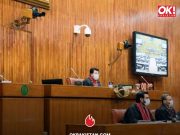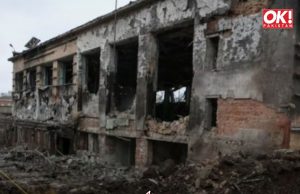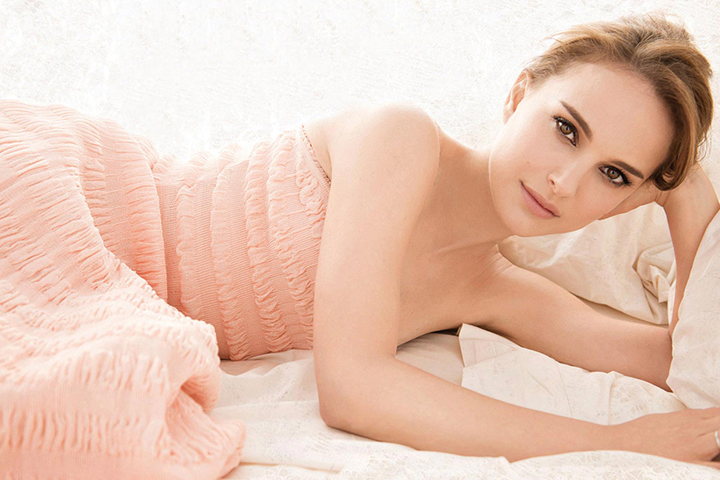
“I enjoy the challenge of doing something that I didn’t think I could do”
Natalie Portman is being tipped to win a second Oscar for her latest role as Jacqueline Kennedy Onassis in Jackie. The actress – who is pregnant with her second child – won an Academy Award in 2011 for her lead role in Black Swan.
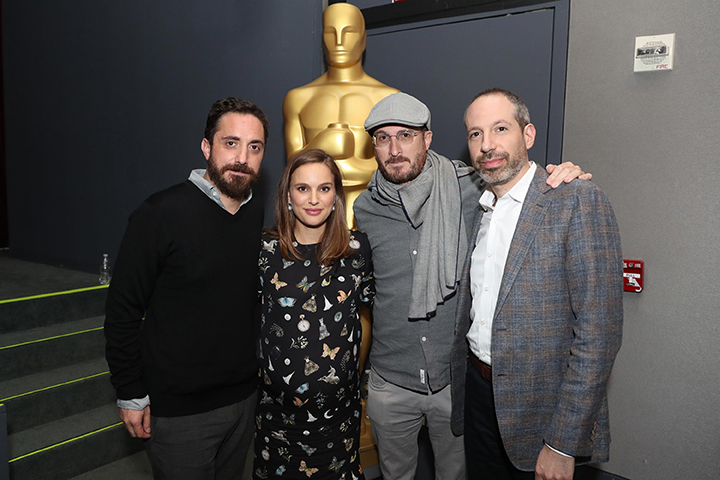
Jackie – which is directed by Pablo Larraín – follows Jacqueline Kennedy in the days when she was First Lady in the White House and her life following the assassination of her husband, President John F. Kennedy in 1963. It focuses on Theodore H. White’s Life magazine interview with the widow at Hyannis Port.
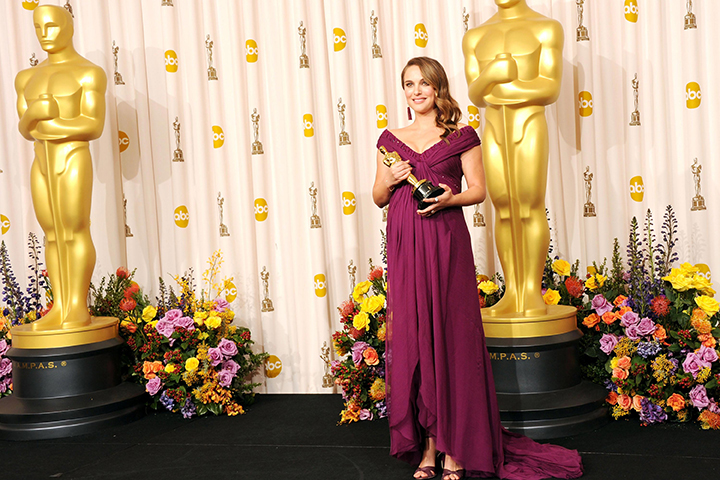
Here, Natalie – who is married to French choreographer Benjamin Millepied – says how she felt about taking on such an iconic character and the preparation she did for the part. She also talks about perfecting the specifics of Jackie’s voice, her style and fashion and whether she related to her celebrity status. Natalie also discusses how she would feel if a movie were made of her life…
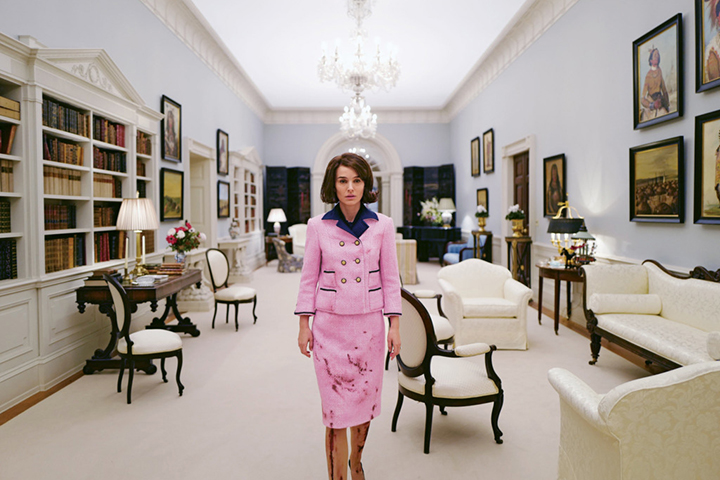
So was this a role you’ve always thought about? People have said, ‘you should do a Jacqueline Kennedy. You kind of look alike?’
Natalie Portman: No, never. [laughs] And I don’t really think I look that much like her, either, apart from being dark-haired and female. The hair and make-up and wardrobe all does a great deal, and it wasn’t anything I’d really ever considered. I hadn’t really thought much about her, to be honest, before thinking about the character. I just had this very superficial notion of her, the facade that we all see, the style, the elegance or whatever. To consider her as a person and of course the crazy life that she experienced was a really amazing exercise, to consider someone’s humanity that you think of as a ‘thing’.

How did you, considering where you are in your life now, bring that life experience into portraying Jackie?
NP: Well luckily I have not had any similar experiences. She really lived through such harrowing events that almost no one, I think, could directly relate. Of course I’ve mourned and grieved in my life, so I can bring some of that, which of course doesn’t include the horror and violence of what she lived through.
I think it was also the terrorist attacks in Paris at the Bataclan that happened about a week before we started shooting. And actually we filmed the movie, the interiors, in a studio just outside of Paris and that was the area that the terrorists had come from, so when we were going to work it was under lockdown with police everywhere. It’s obviously a very different event, but I think you feel the terror and the fear when something happens like that; that has a collective tragedy and a collective mourning, and people get scared. We remember with September 11th, you’re scared to go outside. And when you think that she was feeling that the way that everyone in the country was, but she actually had been next to her own husband, his head exploding in her lap, and then was able to organise something where she was going to walk down the street days later and lead a group of people walking in public, when everyone was scared out of their minds, is so heroic. So I think the fact that those events happened had this strange influence on understanding that kind of ‘in your bones terror’ that the entire country must have been experiencing.
What do you enjoy most of portraying a character like this?
NP: I enjoy the challenge of doing something that I didn’t think I could do. I really was like, ‘This is not my talent. This is not my strength to learn a voice, learn an accent, move like a person.’ I’ve never been a mimic or an imitator. It’s not my skill. It was incredible to get to try it, even though of course that’s only the most superficial level of portraying a person. It’s the emotional part, the underneath part that is much more important, but you have to master the other stuff so you get beyond just the believability with the audience, that they can believe you as this person, before you can get there emotionally.
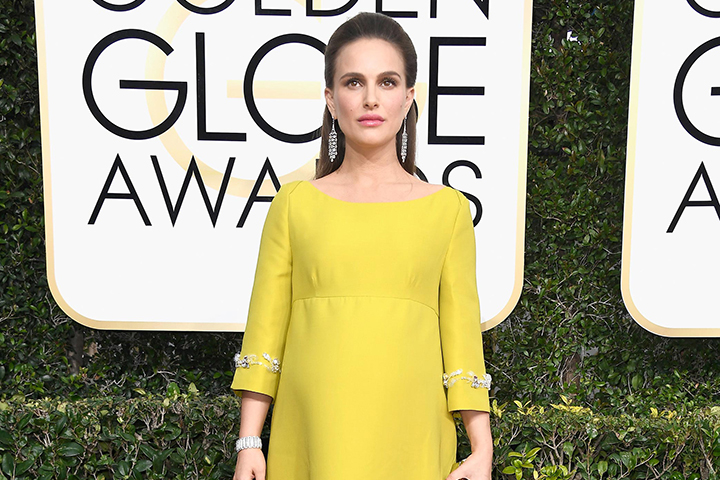
What about comparing and contrasting or relating to her that you’re both celebrities and living in the public eye?
NP: Well, I think I am public to a much less degree than she was, but yes I can relate to it on a different scale, of course. I’m no icon. I’m no symbol. But I think the way that Pablo, the director, allowed the film to be explored, where there’s all these sort of fragments of a person and pieces of a person in different situations with different people, different roles, allowed for a very complete portrait of a woman, which I think is very unusual to let a woman be many different things, because we are different people in different situations. We each have many different people inside of us, men and women, but I think often it’s not explored as much with women, and rarely with men, too. There’s the public person even for someone who’s not well known. There’s who other people think you are, there’s the way you want other people to see you, there’s who you really are, there’s who you want to be, there’s who you should be, I mean there’s all of these aspects and at different moments you are different things and you aspire to different things. That was definitely a big part of the thinking with it, with how to be and which of these characters you show different things to in which situations. Of course there’s an incredibly private, intimate side that can be seen with Nancy, someone who’s known her before she was anyone, and there’s a rawness that she can feel with the priest, but also guardedness because it’s not someone she really knows, but also the ability to express a spiritual crisis.
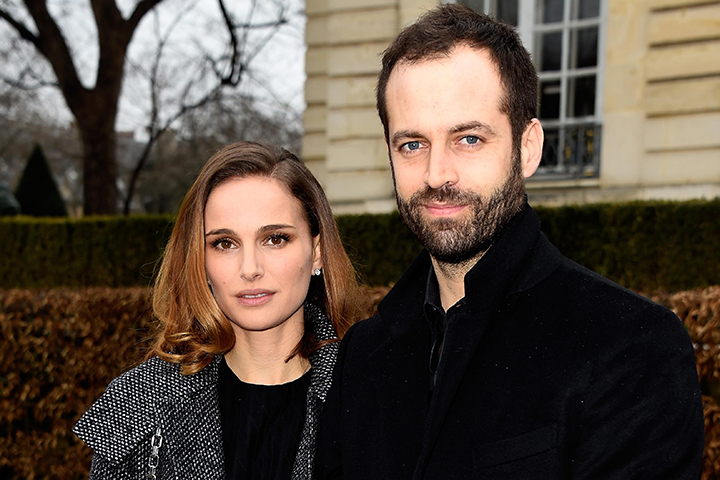
With Bobby?
NP: Then with Bobby of course it’s also private but the strange, sort of familial thing where there’s a husband surrogate, someone who reminds her of her husband, someone who’s been there for her in ways her husband wasn’t, but is also part antagonist, part support system in the face of this tragedy. Then of course the public, when she’s got to show herself and she was very aware of the way she was perceived. They really thought she was a liability to them at the beginning, because people thought she was a snob. They said, ‘Oh, she speaks French and she wears these fancy clothes and she does her hair funny.’ Then all of a sudden as First Lady it was a trend. Everyone started wearing their hair like that, women started taking French classes. It became a whole thing. But on the campaign trail they used to hide her because they thought she wasn’t relatable for women at home. So she knew that she was trying to overcome this image people had of her.
Going back to the voice. Did it affect your vocal cords while you were doing it?
NP: No. (laughs)
Did you need to stay in it?
NP: No. I don’t think that’s really possible when you have a kid. The kid would be like, ‘umm, no.’
There were so many movies made about the Kennedys and Jackie. What did you learn doing this about Jackie, and what do you think this portrayal of this time period is going to show people?
NP: I think that this portrayal really is trying to look at her as a human being and there’s a lot of liberties taken and we’re not claiming that every word that was spoken here actually was spoken.
“Sometimes through the fiction of art, you can get at a truth that might be higher than factual truth, an emotional truth, and I think that’s what we’re hoping for.”
In terms of what I learned about her that I didn’t know before, a lot. I hadn’t really known how sharp she was. I knew she was educated but I didn’t know how smart and understanding of history. She understood, very ahead of her time. Now people are all going around journalists and you all know, writing their own lives, how they want to be perceived on Twitter or Instagram or Facebook. But she was doing that 50 years ago, before that. She was completely controlling how the story was going to be told and she understood history well enough to know that whoever tells the story is the one who makes history. It’s not what actually happened that matters. She understood that and took that agency into her own hands during an incredibly traumatic, tragic mourning period. She had the presence of mind to create that legacy, which is astonishing.
With the funeral and with the Arlington, eternal flame, is that all accurate then? Was she really the one who did those two things?
NP: She was the architect of the entire proceedings. That part is really accurate. There are very specific, detailed notes that have now been opened up in the JFK Library of really everything that went on in terms of the planning, and it was really her design.
What type of personal research did you do for Jackie because you seemed to capture a lot of things?
NP: Oh, thank you. It was a speed course into it, because everything happened very quickly. I met Pablo, I saw his movie, we decided to do it, they got the financing, all of a sudden everybody was like, ‘You’re starting in a month.’ I was like, ‘I’ve got to go research.’ I did it all simultaneously. I read everything I could find. I read like 12 biographies, which sounds more impressive than it is, because they’re really pulpy [laughs]. A lot of it almost feels like, ‘How much of this is true?’ because it’s so pop-y and there’s a lot of liberties taken there, too. But it was nice to at least get into the whole realm and see different people’s point of views who knew her. The most helpful one was not a biography, but it’s actually the transcripts of her interviews with Schlessinger, and it’s amazing because it’s word for word exactly what they said to each other, and there’s tapes that accompany it so I could hear her talking. He was a friend of theirs, so also I could hear her private voice, because online, everything on YouTube is her interviews, her White House tour, which I also listened to obsessively because we of course replicated the White House tour exactly, shot for shot. I studied those with my dialect coach, Tanya Blumstein, who’s amazing. We went through those just over and over and over again to perfect, the accent is a very unusual combination of influences. It was nice to have those different voices. Then the best thing on the Schlessigner is that she edited them, so there’s just these chunks missing, and you’re like, ‘What?’ It was kind of a great mystery because you’d be like, ‘What happened here?’ and then it just gave this great license to kind of do whatever, because she clearly said something that she’s like, ‘Mm, that’s not for the public record.’ What is that? Why did she say it? Why did she get rid of it? How did she get rid of it?
Which is in the movie when she says ‘I never said that’?
NP: Exactly. It gave us license, like with the priest. None of those conversations were recorded.
“It’s quite well documented that she corresponded with priests, that she had a crisis of faith, that she questioned God, that she wanted to commit suicide, that she thought about suicide.”
That is documented, but of course the content of those conversations are completely invented. The content of many of the conversations are completely invented, so it gave the liberty to be free with that.
As a famous person yourself, we always hear as journalists, you can’t libel the dead, so you can say anything about anybody who’s no longer alive and not have to worry about any repercussions. But this is like a rhetoric about Jacqueline Kennedy, where she said things are invented. How do you feel about that, thinking perhaps in terms of your own life, of what people might invent about doing the Natalie Portman story years from now?
NP: Well, I hope for my life not to be as eventful as hers. I hope that my story is just uninteresting to everyone else but myself.
Would you have liked to portray Jackie’s time with Onassis?
NP: No, I think it was really wonderful that Noah [Oppenheim] focused the movie on this very narrow period of time. I think he’s been talking a lot about, which I think is really true, that sometimes you can get more of a sense of a character when they’re in a crucible than trying to tell a cradle to grave story of what their life was, so it was great to get to focus on the few days.
Finally, are you still the ‘bad ass…’ we saw you as on that Saturday Night Live rap skit?
NP: [laughs] No, that was a character for Saturday Night Live. [Laughs]
![]()
INTERVIEW: LUCY ALLEN/HOTFEATURES
PHOTOGRAPHS: GETTY, WENN







